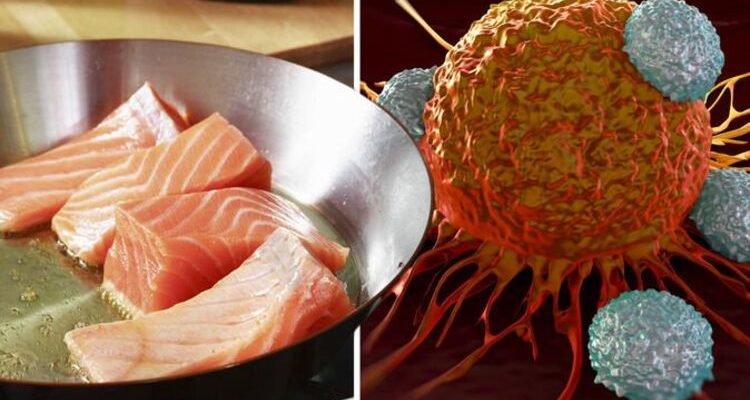Dr Sara Kayat discusses ants that can smell cancer
We use your sign-up to provide content in ways you’ve consented to and to improve our understanding of you. This may include adverts from us and 3rd parties based on our understanding. You can unsubscribe at any time. More info
Cancer is at the forefront of medical concerns as staff shortages could send rates rocketing in coming years. Fortunately, researchers have uncovered a plethora of risk factors to date, and the causative role of diet coming into sharp focus. Some genetic compounds derived from four natural oils could be toxic to for body. For this reason, four vegetable oils may be best avoided when frying foods.
When heated, corn, sunflower, palm and soya bean oils release chemicals known as aldehydes – which have been linked to various cancers.
Some studies suggest toxic compounds may promote the oxidisation of retinaldehyde, transforming it into retinoic acid.
This in turn could lead to the growth and survival of cancer cells.
Unlike other oils, sunflower oil is able to be heated to higher temperatures before it starts smoking.
READ MORE: Cancer warning: Pain in four areas of the body can signal the potentially deadly disease

However, the oil is abundant in polyunsaturated fats which break down into aldehydes when exposed to heat.
The bad taste and smell of Aldehydes should act as a deterrent to their consumption, but eating the heated oil anyway could lead to adverse health outcomes.
In early research conducted by DeMonfort University, researchers found that meals fried in vegetable oils contained 200 times more aldehydes than the daily amount recommended by the World Health Organisation.
Interestingly, the study found that cooking with olive oil, lard and butter produced far lower amounts of aldehydes.
The findings suggested coconut oil may be the healthiest of all the oils.
However, health bodies have historically advised against the regular consumption of saturated fat since it is directly associated with markers for heart disease like high cholesterol.
What’s more, some epidemiological studies suggest there is no convincing evidence that exposure to aldehydes causes cancer in humans.
The World Cancer Research Fund even suggests that ingesting small amounts of the oils may instead offer health benefits by helping the body absorb vitamins.

Separate research has highlighted an additional risk that comes with reusing cooking oils, warning this can increase the risk of colon cancer.
This is because decomposed oils may increase the risk of cancer by mutation and altering the genes that initiate the spread of cancer.
Oils that consist of monounsaturated and saturated fats, on the other hand, tend to be more heat-stable.
These include rapeseed and olive oil, which both have higher levels of monounsaturated fats such as oleic acid.

Separate research has highlighted an additional risk that comes with reusing cooking oils, warning this can increase the risk of colon cancer.
This is because decomposed oils may increase the risk of cancer by mutation and altering the genes that initiate the spread of cancer.
Oils that consist of monounsaturated and saturated fats, on the other hand, tend to be more heat-stable.
These include rapeseed and olive oil, which both have higher levels of monounsaturated fats such as oleic acid.
Source: Read Full Article
